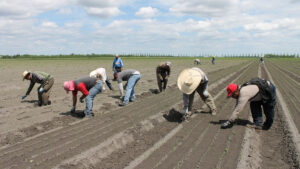When I first started working out at a CrossFit gym, my muscles ached constantly.
After a few months, I asked one of the trainers, “When does the pain go away?” After clarifying what kind of pain I was referring to, he said, “Oh, that never goes away. This is your new normal.”
This seems like a fitting analogy for the church post-pandemic lockdowns. Many churches are wondering, “Why does everything still feel different? Why does faith and being the church seem so complicated and hard?”
The truth is this season of struggle might not go away. Not any time soon. This might be our new normal.
To be clear, our North American struggles today pale in comparison to the struggles and suffering of the global church throughout history. Yet this doesn’t negate the fact that practicing our faith and being the church has never seemed so complicated and difficult, in our lifetime, in our cultural context.
Personally, I’ve hit more walls of discouragement in my ministry since March 2020 than the entirety of my 23 years prior. Yet I’m reminded of the adage, “No pain, no gain.”
According to the Bible, seasons of suffering, adversity and struggle are necessary and valuable.
I don’t understand how this applies to all suffering on planet Earth, but I’ve come to understand and appreciate how this applies to my life and ministry.
We need difficult seasons to grow.
Paul says, “we rejoice in our sufferings, because suffering produces endurance, and endurance produces character” (Romans 5:3-4). James says, “we should consider it pure joy when we face trials and tribulations, because the testing of your faith produces perseverance” (James 1:2-3).
There are certain traits and qualities, like patience, resilience, perseverance and courage, that only grow in us through suffering, adversity and struggle.
If we prioritize growth, we not only value these tough seasons, we rejoice in them—not because our faith is masochistic, but because our faith enables us to see they are producing beneficial fruit in our lives.
Twenty years ago, a Zimbabwean pastor told me, “One thing I’ve learned about North American Christians: You don’t like to hurt. You don’t like to suffer or be uncomfortable.”
At the time I thought, “What a strange thing to say. Who likes to suffer?”
I’ve come to realize he was right.
Our North American mindset, obsessed with eliminating and avoiding suffering and hardship at all costs, has undermined our trust in the divine wisdom telling us suffering, adversity and trials are necessary and valuable.
We cannot grow and become the best versions of ourselves without them.
Fifteen years ago, I was going through a difficult time. I met with a mentor named Dave, who was a missionary in Zambia for many years. I said, “Dave, I’m really struggling.”
His response surprised me.
“That’s good,” he said. “Struggle is a sign of life. When the fish on the end of your line is struggling, that means it wants to live and be set free. It’s the same with us. None of us are perfect. We all have stuff in our lives we’re struggling with. If we aren’t, we’re either spiritually asleep or we’ve given up.”
I’ve experienced a breakthrough recently, as I practice being grateful for adversity, struggle and suffering. I trust God is using them to produce growth in me—growth that can’t happen any other way.
Paul says, “Don’t grow weary in doing good and being faithful, for we will reap a harvest in due season, if we don’t lose heart” (Galatians 6:9).
There will be times in our lives when we put in the work but don’t see any results; when we’re faithful, but don’t reap the fruit of our labour.
This happens in all areas of our lives: our jobs, careers, marriages, parenting, friendships and in our work for peace and justice. It also happens in our faith development and spiritual journeys.
This can be discouraging. Human beings are designed to be fuelled by progress. It’s tempting to slack off or give up when we’re not seeing results.
Yet having faith means not only being faithful to God, even when (especially when) it’s hard, it means trusting God will be faithful as well; trusting that in due season, we will reap a harvest if we don’t give up.
Troy Watson is a pastor at Avon Church in Stratford, Ontario, and can be reached at troy@avonchurch.ca.








Leave a Reply
You must be logged in to post a comment.